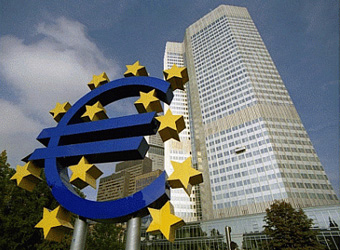The European Central Bank left interest rates at a record low on Thursday but said it remained ready to act, acknowledging that emerging market turbulence could hit theeuro zone.
Risks to the currency bloc’s economy remain skewed to the downside, ECB President Mario Draghi said after interest rates were held at 0.25 percent, and inflation would be low for a protracted period.
“Developments in global money and financial market conditions and related uncertainties, notably in the emerging market economies, may have the potential to negatively affect economic conditions,” Draghi told a news conference.
“The reason for today’s decision not to act has really to do with the complexity of the situation … and the need to acquire more information,” he said.
A sharp drop in euro zone inflation to 0.7 percent in January, well below the ECB’s target of just under 2 percent, would have focused policymakers’ minds, particularly since emerging turmoil could put further downward pressure on prices.
The ECB also left the deposit rate it pays on bank deposits at zero and held its marginal lending facility – or emergency borrowing rate – at 0.75 percent.
The euro and euro zone money market rates rose in response. <GVD/EUR>
If emerging market turmoil persists, a move is more likely next month when the ECB’s staff will produce fresh economic forecasts. If they downgrade their inflation estimate – already at just 1.2 percent for 2014 – action could follow.
“Further information and analysis will become available in early March,” Draghi said, adding that the forecasts will include a first look at 2016.
Inflation expectations, he said, remained firmly anchored.
If that assessment changes then a significant policy response would be likely.
“There is certainly going to be subdued inflation, low inflation for an extended, protracted period of time, but no deflation,” Draghi said.
Money market traders had expected no change in rates, nor any other policy steps, a Reuters poll taken on Monday showed.
The Bank of England faces a different problem – trying to convince markets that resurgent growth will not require an early interest rate rise. It too left policy on hold on Thursday.
DANGER ZONE
The ECB is wary of inflation getting stuck in what Draghi has dubbed a “danger zone” below 1 percent and vowed again to keep rates at present or lower levels for an “extended period”.
An emerging market selloff risks forcing the euro higher, which would put more downward pressure on prices.
For now, economic recovery is intact, though still in its infancy. The euro zone’s private sector logged its busiest month in 2-1/2 years in January, surveys showed on Wednesday.
“We must be extremely cautious about this recovery. It is still fragile and it is still uneven,” Draghi said.
A month ago, he set out markers for further ECB action, pledging the central bank would take action if its inflation outlook worsened or money markets saw “unwarranted” tightening.
But the ECB does not have a lot of ammunition left to boost inflation. There might be only one more rate cut in its arsenal and even that would be smaller than the traditional quarter point.
Short-term interest rate volatility has been another headache for the ECB.
By refraining from action, the ECB risks making it more difficult to convince markets of its easing bias and keep the euro from shooting up.
To prevent spikes in market rates, the bank could choose to end offsetting government bond purchases made when the euro debt crisis was raging, which would add about 175 billion euros ($236.82 billion) to the money markets.
Draghi said that was one option under consideration but was not discussed at Thursday’s meeting.
“We remain firmly determined to maintain the high degree of monetary accommodation and to take further decisive action if required,” he said.
Source: Reuters



